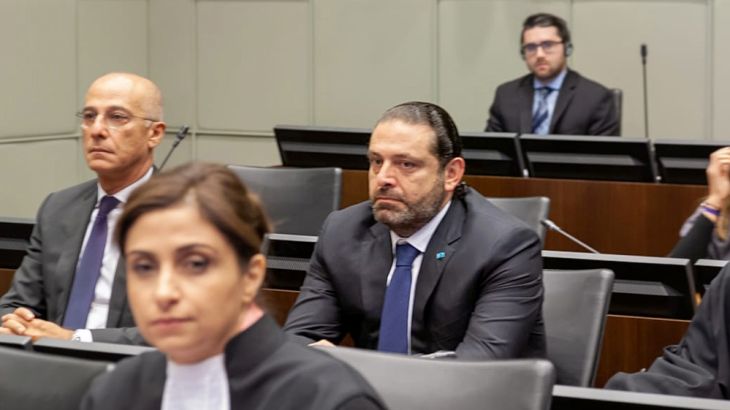Lebanon’s Saad Hariri demands ‘justice’ for slain father at trial
Prosecutors say Rafik Hariri was killed by Hezbollah in 2005 because he opposed Syria’s control over Lebanon.

Lebanon’s prime minister has demanded “justice” at the trial of four members of Hezbollah who are suspected of planning and executing the assassination of his father, Rafik Hariri.
Prosecutors say Hariri, a billionaire and former prime minister, was targeted by the armed group in 2005 because he opposed Syria’s control over Lebanon.
Keep reading
list of 4 itemsHezbollah fires dozens of rockets into northern Israel
Hezbollah commander killed in Israeli drone strike in Lebanon
Mapping Israel-Lebanon cross-border attacks
He was killed along with 21 others on February 14, 2005, when a massive truck bomb hit his convoy in the capital Beirut.
More than 200 people were wounded in the explosion.
Speaking outside the Special Tribunal for Lebanon at The Hague on Tuesday, Hariri’s son, designate Prime Minister Saad Hariri said while he had “no doubt” that Syria had a “huge problem” with his father, he would “deal with this issue as a responsible official” to maintain his country’s fragile political balance.
“From the start, we demanded justice because we believe that justice and the truth protect Lebanon,” Hariri told reporters after the first day the closing arguments at the trial.
“This is what we always wanted and we never resorted to revenge.”
‘Play with fire’
Hezbollah leader Hassan Nasrallah has refused to hand over the four suspects and has warned the tribunal against “play[ing] with fire”.
Meanwhile, Syrian President Bashar al-Assad has called the trial a tool to “pressure Hezbollah”.
Syrian security forces and intelligence agents maintained a physical presence in Lebanon for nearly 30 years before Damascus finally withdrew its troops in 2005.
|
|
During his second term as prime minister, from 2000-2004, Rafik Hariri allegedly made it clear to Syria that he wanted Lebanon to manage its own affairs.
“The tribunal means nothing to us at all and its rulings are of no value,” Nasrallah said in an August 27 address.
“To those betting on the tribunal creating a new situation that can be capitalised on … I say, ‘Do not play with fire.'”
The armed group has refused to turn over the four indicted men – Salim Ayyash, Hussein Oneissi, Assad Sabra and Hassan Habib Merhi – for the trial which began in January 2014.
Ayyash is accused of leading the team that carried out the attack, while Oneissi, Sabra and Merhi are accused of general involvement in the plot.
The alleged mastermind, Mustafa Badreddine, was indicted by the court but is now believed to have died while leading forces fighting with the Syrian government against the opposition.
‘Darkness and horror’
Prosecuting counsel Nigel Povoas has said the huge scale of the attack “undoubtedly had a political purpose” linked to Hariri’s opposition to Damascus’s long involvement in his country.
“The scene was plunged into darkness and horror, cars were eviscerated, incinerated and on fire, people were on fire. Lebanon itself was plunged into darkness and horror, that was exactly what was intended by the attack,” he told the court.
“Hariri was perceived by those who supported Syrian control as a severe threat to their interests and security, a proxy of the West,” he told the court. “This is the reason, the non-personal motive, behind the crime.”
Al Jazeera’s Zeina Khodr, reporting from The Hague, said the court’s credibility “was at question” with the type of evidence it was presenting.
“The suspects remain at large. They are being tried in absentia and they are unlikely to appear in court.
“The closing arguments from the prosecution claim this was a skilful and sophisticated attack. They’re also arguing that this attack was politically motivated … but the evidence they’re presenting is circumstantial, it’s not direct.
“But the prosecution says it is compelling.”
Prosecutors say their case – which relies on mobile phone records allegedly showing the suspects conducting intense surveillance of Hariri from just after his resignation until minutes before the blast.
The verdict in the trial is expected to be announced early next year.